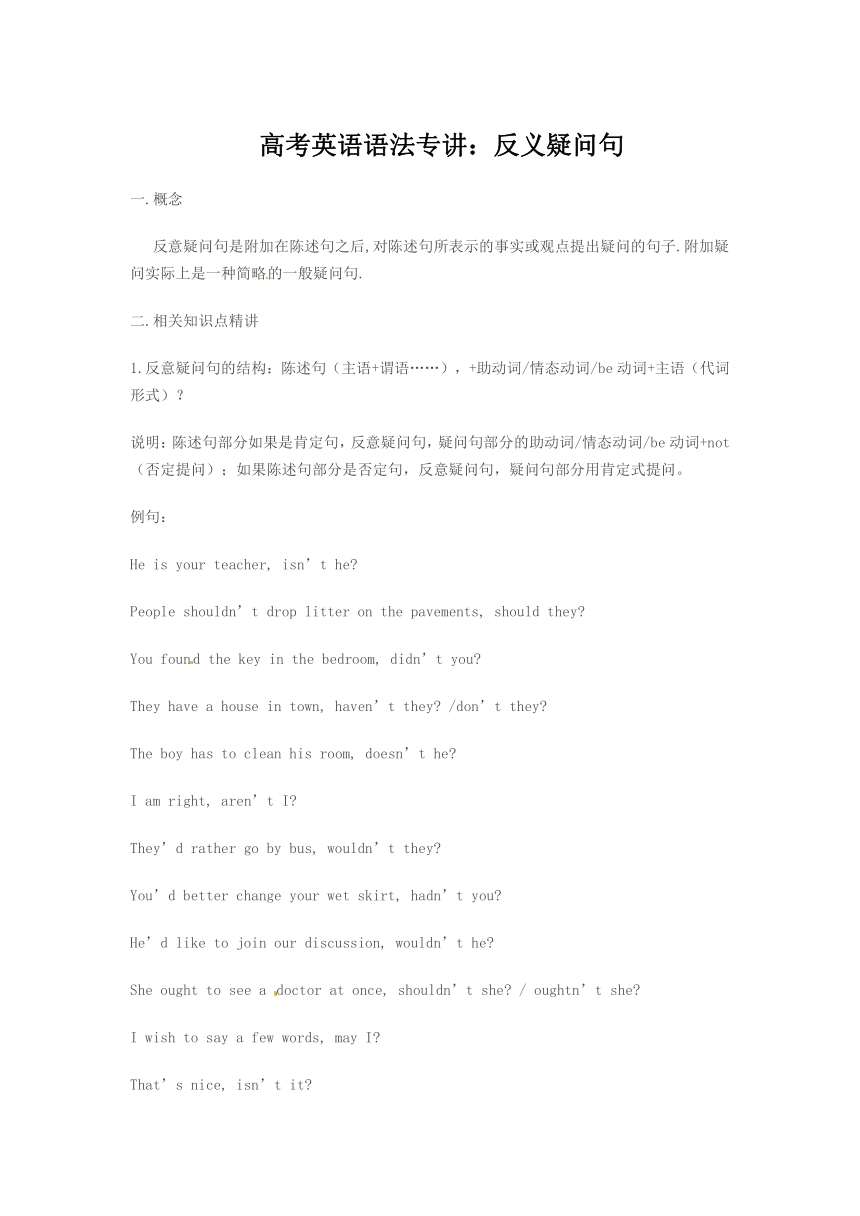【语法专攻 精讲推荐】2014届高考英语高频语法串讲:反义疑问句
文档属性
| 名称 | 【语法专攻 精讲推荐】2014届高考英语高频语法串讲:反义疑问句 |  | |
| 格式 | zip | ||
| 文件大小 | 14.4KB | ||
| 资源类型 | 教案 | ||
| 版本资源 | |||
| 科目 | 英语 | ||
| 更新时间 | 2014-03-15 20:55:44 | ||
图片预览

文档简介
高考英语语法专讲:反义疑问句
一.概念
反意疑问句是附加在陈述句之后,对陈述句所表示的事实或观点提出疑问的句子.附加疑问实际上是一种简略的一般疑问句.
二.相关知识点精讲
1.反意疑问句的结构:陈述句(主语+谓语……),+助动词/情态动词/be动词+主语(代词形式)?
说明:陈述句部分如果是肯定句,反意疑问句,疑问句部分的助动词/情态动词/be动词+not (否定提问);如果陈述句部分是否定句,反意疑问句,疑问句部分用肯定式提问。
例句:
He is your teacher, isn’t he
People shouldn’t drop litter on the pavements, should they
You found the key in the bedroom, didn’t you
They have a house in town, haven’t they /don’t they
The boy has to clean his room, doesn’t he
I am right, aren’t I
They’d rather go by bus, wouldn’t they
You’d better change your wet skirt, hadn’t you
He’d like to join our discussion, wouldn’t he
She ought to see a doctor at once, shouldn’t she / oughtn’t she
I wish to say a few words, may I
That’s nice, isn’t it
This is the place, isn’t it
Everybody knows the answer, don’t they
Nothing is serious, isn’t it
There wasn’t enough time at that moment, was there
There used to a tower here, usedn’t there / didn’t there
What you need is more practice, isn’t it
2.某些特殊句型的反意疑问句:
1)祈使句的反意疑问句:
表示肯定意义的祈使句,即表示“请求,提示”它的反意疑问句用will you 表达:有时也可以用won’t you 表示。
Go home now, will you
Close the window, please, will you
否定祈使句:以Don’t开始的祈使句:表示“不要……”,用will you 提问:
Don’t be late again, will you
Don’t forget to pay your income tax, will you
一.概念
反意疑问句是附加在陈述句之后,对陈述句所表示的事实或观点提出疑问的句子.附加疑问实际上是一种简略的一般疑问句.
二.相关知识点精讲
1.反意疑问句的结构:陈述句(主语+谓语……),+助动词/情态动词/be动词+主语(代词形式)?
说明:陈述句部分如果是肯定句,反意疑问句,疑问句部分的助动词/情态动词/be动词+not (否定提问);如果陈述句部分是否定句,反意疑问句,疑问句部分用肯定式提问。
例句:
He is your teacher, isn’t he
People shouldn’t drop litter on the pavements, should they
You found the key in the bedroom, didn’t you
They have a house in town, haven’t they /don’t they
The boy has to clean his room, doesn’t he
I am right, aren’t I
They’d rather go by bus, wouldn’t they
You’d better change your wet skirt, hadn’t you
He’d like to join our discussion, wouldn’t he
She ought to see a doctor at once, shouldn’t she / oughtn’t she
I wish to say a few words, may I
That’s nice, isn’t it
This is the place, isn’t it
Everybody knows the answer, don’t they
Nothing is serious, isn’t it
There wasn’t enough time at that moment, was there
There used to a tower here, usedn’t there / didn’t there
What you need is more practice, isn’t it
2.某些特殊句型的反意疑问句:
1)祈使句的反意疑问句:
表示肯定意义的祈使句,即表示“请求,提示”它的反意疑问句用will you 表达:有时也可以用won’t you 表示。
Go home now, will you
Close the window, please, will you
否定祈使句:以Don’t开始的祈使句:表示“不要……”,用will you 提问:
Don’t be late again, will you
Don’t forget to pay your income tax, will you
